How was the media’s performance at this week’s presidential press conference? With one or two exceptions, pretty good. In addition to all the expected (and important) questions about the debt ceiling debate, reporters pressed President Obama on same-sex marriage, the constitutionality of the War Powers Act, the NLRB’s complaint against Boeing, whether deficit talks hinder job creation efforts, even how the military should handle suspected terrorists captured in the field. And while Obama didn’t really make any news that he hadn’t planned to, the press did get some interesting answers—and some interesting non-answers—for its trouble.
One of the striking things about the questions, though, was just how wedded they were to topics that were already part of the news cycle. Even that unlikely query about protocols for captured terrorists, from Mark Landler of The New York Times, was prompted by testimony delivered in Congress this week. Against this backdrop, a question about a pressing but not especially “newsy” issue—like, say, wrongful home foreclosures, which Paul Kiel of ProPublica recently reported are still occurring—would have been truly unexpected.
This isn’t the least bit surprising. The president calls a press conference when he wants to communicate a message about a particular newsworthy subject, which is likely to dominate the event. (In Wednesday’s case, that message was: Blame the Republicans for this debt ceiling impasse.)
The risk in this arrangement, though, is that issues that aren’t deemed worthy of a press conference of their own—and that don’t, by virtue of circumstance, come up as a news peg just as one happens to be convened—simply do not get asked about. That hardly prevents reporters from covering those stories, of course. But it means that they are left off the agenda of a ritual that’s at the center of the relationship between our press and our government, which may mean opportunities for accountability and insight are missed.
To get a sense of how real this risk is, I took a look at the transcripts for press conferences throughout Obama’s presidency, which are available at the website of The American Presidency Project. (For Wednesday’s presser, not yet archived by the APP, I used the transcript from whitehouse.gov.) I omitted press conferences that did not take place on U.S. soil, as well as those in which Obama appeared alongside a foreign head of state or other top official, because the type of number of questions asked at those events tends to be different. That left sixteen press conferences—six in 2009, seven in 2010, and three so far this year. I collected all the questions asked by reporters at those events, and discarded Obama’s replies.
I then grouped the questions in five chronological sets and fed them into Wordle, the gimmicky-but-fun Web program that spits back “word clouds” in which more frequently occurring words appear in larger font. (The program eliminates many common English words; I deleted some other non-substantive words and phrases—“like,” “just,” “Thank you, Mr. President,” etc.—that appeared frequently.) This exercise is obviously extremely arbitrary and unscientific—but if taken with a fistful of salt it can also, I think, be illuminating.
Here’s the Wordle for the first three press conferences of Obama’s presidency, held between February and April 2009:
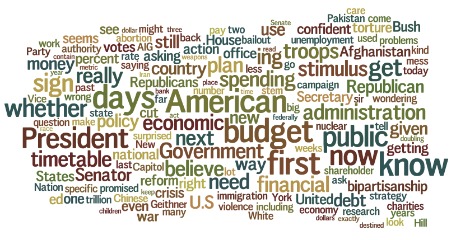
What stands out here is how little anything stands out. Part of that, no doubt, is because so early on, the media was still trying to get the new president on the record on a range of issues. Part of it is that there was not yet any gridlocked legislative debate consuming all the attention in Washington.
But part of it, too, is that at this stage Obama was making a conscious effort to involve niche media outlets. And reporters from those outlets asked questions that don’t normally get asked. On March 24, a reporter from Ebony asked about homelessness. On April 29, a reporter from BET asked about the black unemployment rate. These were opportunities for the president to signal his engagement with these issues to parts of his base, no doubt. But they were also refreshing deviations from the typical catechism of a White House press conference.
Here’s the Wordle for the second set of 2009 conferences, held between June and September.
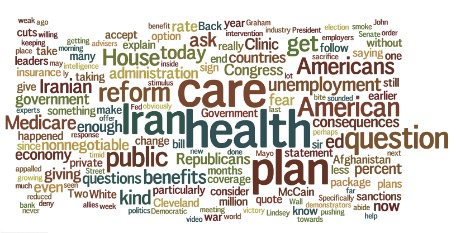
Not much to add here. Health care and Iran’s would-be “Green Revolution” were the big topics that summer, and they dominated the discussion, with a little bit of unemployment talk to round out the mix. For those wondering—“consequences” goes with Iran; “nonnegotiable” goes with the public option fight. The press corps is forever trying to get the president to draw lines in the sand.
Here are the first three press conferences of 2010, held from February to May (i.e., before “town hall” craziness broke out):
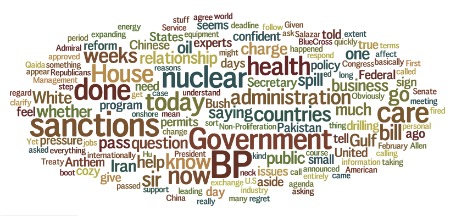
More health care, the Gulf oil spill, and the debate over sanctions in connection with Iran’s suspected nuclear program. But those topics disappeared by the second half of 2010, when Obama held four press conferences between September and December:
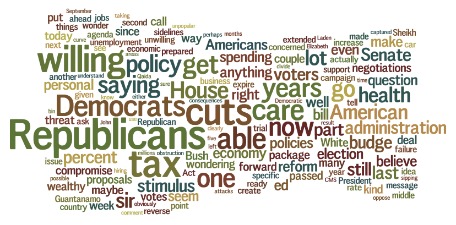
The GOP landslide in the midterms put partisan gridlock on everybody’s mind, and the fight over the Bush tax cuts at the center of the agenda.
In 2011, it’s focused on tax cuts and other aspects of the parties’ fiscal fight:
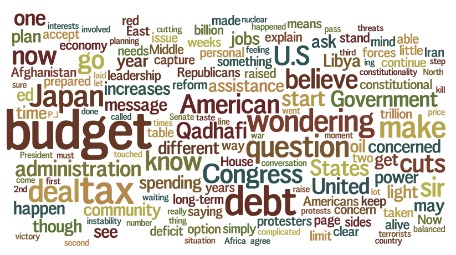
The Wordles seem to confirm that, most of the time, given subjects do dominate at these press conferences. But they can’t show whether other issues come up regularly without dominating discussion, or are mostly ignored. So I went back to the full list of questions and searched for specific words that seemed relevant to America’s current challenges, to see how often they’ve come up.
Here’s what I found (again, treat these results with caution): In the transcripts I reviewed, the word “education” was used one time in a reporter’s question—and that was back on March 24, 2009, when Chip Reid asked how Obama could square his plan to invest in education with his commitment to get the debt under control.
How about the housing crisis? The word “foreclosure” was also used only once—on Feb. 9, 2009, when Jake Tapper listed it as one of several criteria that might be used to judge whether the economy had rebounded. The word “mortgage” has been used twice, and not since April 2009.
The word “housing” itself, meanwhile, seems not to have been used at all — and that’s despite the fact that the tail end of 2010, when coverage of foreclosure fraud peaked, is also when Obama held press conferences most frequently. (That period is also when prominent White House correspondent Peter Baker would have been reporting his January 2011 NYT Magazine article on Obama’s economic policy, which notably neglected the administration’s response to the housing crisis.)
Obama did address those topics himself during these press conferences, and his comments may have made it into the ensuing coverage. But as a point of comparison, consider: the word “jobs” was used eleven times in reporter’s questions in the transcripts I reviewed, and “unemployment” twelve; neither dominated during a specific period, but they’ve cropped up repeatedly. Meanwhile, “debt” was used sixteen times, “deficit” eight, and “budget” a whopping twenty-four.
The White House press corps can clearly converge on an issue agenda—but education policy and the housing crisis (and plenty of other stuff) just as clearly aren’t on it. That means that, in the absence of specific events that make them timely and newsy, they just don’t get asked about.
Oh, and speaking of timeliness—one of the most commonly used words, cropping up twenty-three times in the reporters’ questions I reviewed? “Today.”
Greg Marx is an associate editor at CJR. Follow him on Twitter @gregamarx.
